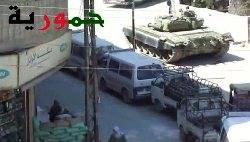Fierce clashes erupted on Tuesday as Syria's regime sent reinforcements into opposition areas despite a truce pledge, and the UN said it was rushing a team to Damascus to pave the way for peace monitors.
The surge in violence killed at least 38 people, including 25 civilians, mostly in north and central Syria, and saw a string of arson attacks on homes, activists and monitors said.
It came a day after peace envoy Kofi Annan told the UN Security Council that President Bashar al-Assad had given assurances he would "immediately" start pulling back his forces and complete a military withdrawal from urban areas by April 10.
Foreign Minister Walid Muallem on Tuesday pledged Syria would do its utmost to ensure the success of a Red Cross mission as he met the organization's head, Jakob Kellenberger, who was in Damascus to seek a daily humanitarian ceasefire.
But the United States accused Assad of failing to honor his pledged troop withdrawal, as monitors reported heavy fighting in opposition strongholds in the southern region of Daraa, the central city of Homs, northwestern Idlib province and near the capital.
Dozens of armored personnel carriers arrived in Dael, a town in Daraa province where the uprising against Assad began in March 2011, as well as in Zabadani, a bastion of the revolution near the border with Lebanon.
Clashes in the Atbaa area of Daraa province left three civilians and two soldiers dead, according to the Syrian Observatory for Human Rights.
In Idlib, heavy fighting took place on the outskirts of the town of Taftanaz, where five civilians, four revolution fighters and seven soldiers were killed amid heavy machinegun fire and shelling, the Britain-based monitoring group said.
Clashes killed two civilians elsewhere in the province.
In central Homs, 10 civilians were killed in shelling of several neighborhoods of the city and five others died in fighting elsewhere in the province.
The Observatory has charged that the army is torching and looting houses across Syria in a campaign that could amount to crimes against humanity.
Washington said on Tuesday that Assad was failing to live up to pledges for a truce.
"The assertion to Kofi Annan was that Assad would start implementing his commitments immediately to withdraw from cities. I want to advise that we have seen no evidence today that he is implementing any of those commitments," US State Department spokeswoman Victoria Nuland told reporters.
In Geneva, a spokesman for Annan said the office of the UN-Arab League envoy expected a "UN advance team on the deployment of monitors to arrive in Syria in the next 48 hours."
In a briefing Monday to the Security Council, Annan sought a broad mandate for the monitoring mission as he reported "no progress" on reaching a ceasefire, according to diplomats.
The Council was also told it could take at least two months to get a full mission of about 250 observers into Syria if a ceasefire is declared, one diplomat said.
Syria's UN envoy, Bashar Jaafari, confirmed the April 10 date had been agreed "by common accord" between Annan and his government.
The partial implementation of Annan's six-point peace plan would include a full cessation of hostilities within 48 hours of the deadline, according to diplomats in New York.
The United States, Britain and France were to send the Security Council a draft statement on Tuesday putting a formal stamp on the deadline and warning Assad of possible "further measures" if he reneges on the truce, they said.
Russia, Assad's veto-wielding ally in the Council, has rejected the idea of a deadline, with Foreign Minister Sergei Lavrov saying "ultimatums and artificial deadlines rarely help matters."
International Committee of the Red Cross chief Kellenberger, on his third mission to Damascus since it launched a protest crackdown which the UN says has killed more than 9,000 people, said ahead of his trip that he would seek a daily two-hour humanitarian ceasefire.
Kellenberger also met Interior Minister Mohammed al-Shaar, with state news agency SANA saying their talks focused on how the ministry can facilitate the ICRC's work in Syria "regarding the inspection of penal facilities and meeting inmates in them."
The Syrian authorities allowed the ICRC to visit the central prison in Damascus for the first time last year.
PHOTO CAPTION
An image grab from a video posted on YouTube shows a Syrian army tank in a suburb of Damascus.
AFP


 Home
Home Discover Islam
Discover Islam Quran Recitations
Quran Recitations Lectures
Lectures
 Fatwa
Fatwa Articles
Articles Fiqh
Fiqh E-Books
E-Books Boys & Girls
Boys & Girls  Hajj Rulings
Hajj Rulings Hajj Fatwas
Hajj Fatwas














